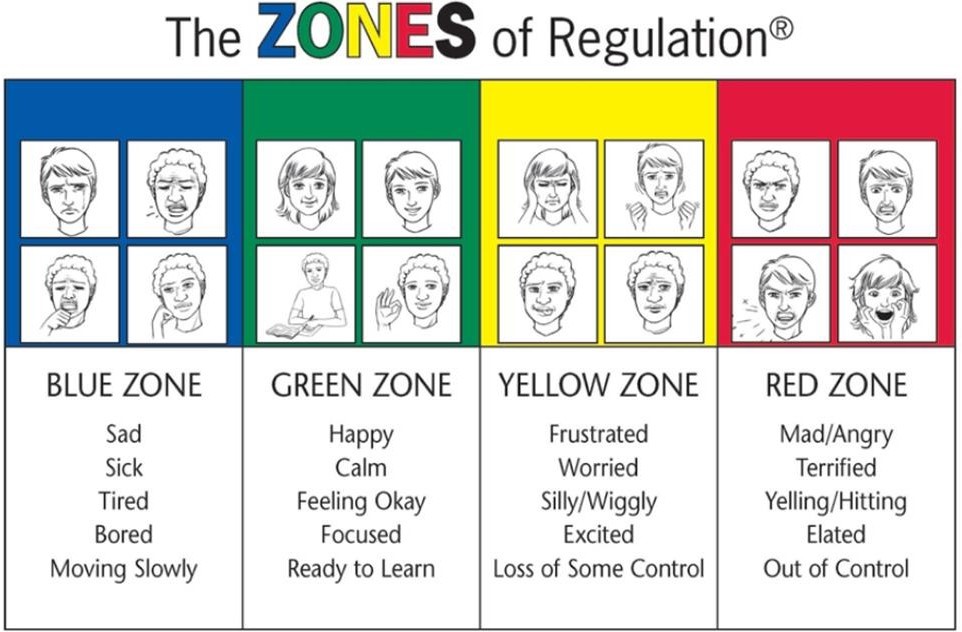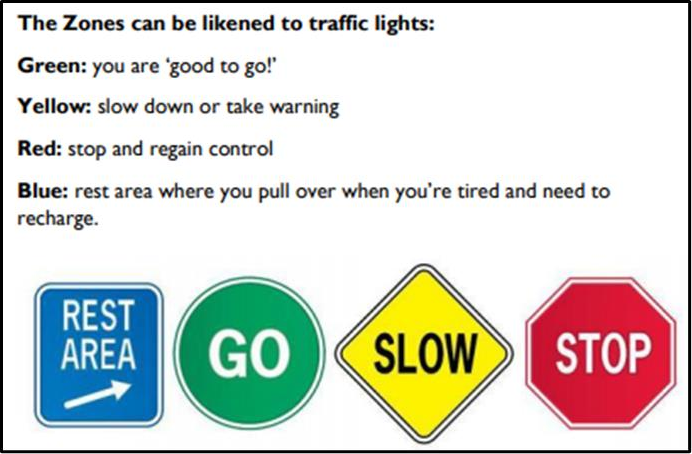

The Zones of
Regulation is an internationally renowned intervention which helps children to
manage difficult emotions, known as ‘self-regulation’.
Self-regulation
can go by many names such as ‘self-control’, ‘impulse management’ and
‘self-management’. Self-regulation is best described as the best state of
alertness for a situation. For example, when your child takes part in a sports
game, they would need to have a higher state of alertness than when, for
example, they were working in a library.
From time to
time, all of us (including adults) find it hard to manage strong feelings such
as worry, anger, restlessness, fear or tiredness, and this stops us from
getting on with our day effectively. Children who feel these emotions often
find it hard to learn and concentrate in school. The Zones of Regulation aims
to teach children strategies to help them cope with these feelings so they can
get back to feeling calm and ready to learn. These coping strategies are called
‘self-regulation’.

At Barrow
Primary School, we are launching the Zones of Regulation throughout the whole
school. We want to teach allof
our children good coping and regulation strategies so they can help themselves
when they experience anxiety and stress. In the classroom, sometimes children
panic when faced with a tricky learning problem or challenge. By teaching them how to cope with these feelings
might make them better at tackling learning challenges and build better
resilience so they don’t give up so easily when faced with difficulty.
We want
children at Barrow to grow into successful teenagers then adults. Teaching the children
at a young age about managing their feelings will support them in later
life so that they don’t turn
to negative coping strategies which affect their mental and physical wellbeing.
We aim to help children to:
Blue Zone: low level of arousal; not ready to learn; feels sad, sick, tired, bored, moving slowly.
Green Zone: calm state of alertness; optimal level to learn; feels happy, calm, feeling okay, focused.
Yellow Zone: heightened state of alertness; elevated emotions; has some control; feels frustrated, worried, silly/wiggly, excited, loss of some control.
Red Zone: heightened state of alertness and intense emotions; not an optimal level for learning; out of control; feels mad/angry, terrified, yelling/hitting, elated, out of control.

We will teach the children that everyone experiences all of the Zones. The Red and Yellow zones are not ‘bad’ or ‘naughty’ Zones. All of the Zones are expected at one time or another. We will show them that the Blue Zone, for example, is helpful when you are trying to fall asleep.

Can my child be in more than one zone at the same time?
Yes. Your child may feel tired (blue zone) because they did not get enough sleep, and anxious (yellow zone) because they are worried about an activity at school. Listing more than one Zone reflects a good sense of personal feelings and alertness levels.
Should children be punished for being in theIt’s best for children to experience the natural consequences of being in the RED zone?
If a child’s actions/choices hurt someone or destroys property, they need to repair the relationship and take responsibility for the mess they create. Once the child has calmed down, use the experience as a learning opportunity to process what the child would do differently next time.
Can you look like one Zone on the outside and feel like you are in another Zone on the inside?
Yes. Many of us “disguise” our Zone to match social expectations. We use the expression “put on a happy face” or mask the emotion so other people will have good thoughts about us. Parents often say that their children “lose it” and goes into the Red Zone as soon as they get home. This is because children are increasing their awareness of their peers and expectations when in the classroom. They make every effort to keep it together at school to stay in the Green Zone. Home is when they feel safe to let it all out.
www.weareteachers.com/zones-of-regulation-activities
https://www.theottoolbox.com/?s=zones+of+regulation
The Zones of Regulation - An Overview of The Zones for Parents (hes-extraordinary.com)